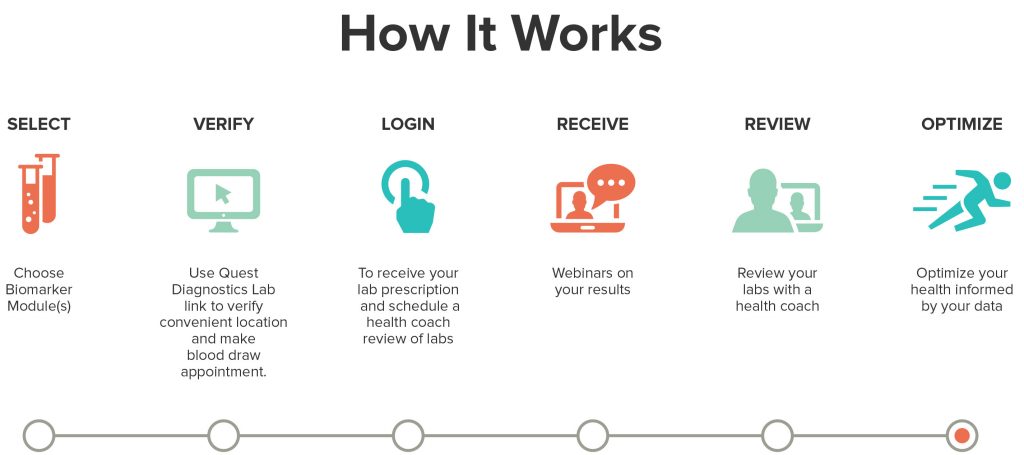The Athlete Panel
The Athlete Panel is geared for optimal performance. In fact, our test panel was created based on commonly ordered tests on the best athletes in the world – Olympians. A recent study showed that 40% of lab results in Olympic athletes were abnormal. Our panel can used to analyze adaptation to training and identify physiological explanations for changes in performance.
The Athletic Panel measures important nutrients including Vitamin B12 and Vitamin D. Vitamin B12 deficient athletes may have decreased cognitive function causing impaired concentration, or compromised aerobic capacity resulting in decreased athletic performance. Performance may also be enhanced by optimizing Vitamin D levels. Vitamin D has been shown to increase the size and number of type II fast twitch muscle fibers and is directly associated with musculoskeletal performance and the prevention of bone loss.
Lipid panels are a routine part of health screening of the athlete. The basic lipid panel includes total cholesterol, which measures all of the cholesterol in all of the lipoprotein particles. It also measures LDL, the low-density lipoprotein, often called “bad cholesterol” because it deposits excess cholesterol in the lining of blood vessels. It then measures HDL, high-density lipoprotein, often called “good cholesterol” because it removes excess cholesterol and carries it to the liver for removal. The high-density lipoprotein is typically high in athletes and is often abnormally high in well-trained athletes, which optimizes the health of their vascular system. Lastly, the lipid profile also measures triglycerides, which measures of all the triglycerides in all the lipoprotein particles. Triglycerides are an excellent way to monitor the athlete’s dietary adherence.
The CBC is performed to determine a general health status and to screen for, diagnose, or monitor any one of a variety of diseases and conditions that affect blood cells, such as anemia, infection, bleeding disorders, or cancer. The hematocrit and platelet count can sometimes be abnormally high in athletes, particularly if the athlete is dehydrated Iron-deficiency anemia is the most common cause of anemia in athletes and presents with common signs such as fatigue, headache, joint pain and weakness, which could otherwise be overlooked as a sign of over-training or dehydration. It is therefore extremely important to screen for this type of anemia by utilizing a complete blood count along with serum ferritin.
The comprehensive metabolic panel measures kidney and liver function, serum glucose, and important electrolytes. BUN and serum creatinine are part of the comprehensive metabolic panel. These biomarkers are primarily used to evaluate kidney function, muscle breakdown, and to monitor athletes with acute kidney injury. It also may be used to evaluate general health status. They may be elevated due to conditions that result in decreased blood flow to the kidney such as stress, severe sunburns, or dehydration. Serum fasting glucose is a screen for prediabetes and diabetes. In the athletic population, glucose levels may be elevated acutely due to stress and demands of exercise. Fasting levels are the most reliable. Electrolytes such as sodium and potassium are frequently abnormal in the athlete and are routinely evaluated. A high blood sodium level is almost always due to inadequate water intake and dehydration, with symptoms including dry mucous membranes, thirst and restlessness. In the athlete, sodium levels may be low with excess water intake. Severely low sodium levels may produce nausea, cramping, or neurologic problems and may quickly become a medical emergency if not addressed properly. This has been reported in up to 50% of marathon runners who collapse at the finish line and can be life-threatening if not managed appropriately.
The liver is evaluated by testing liver enzymes and proteins produced by the liver. Two key important biomarkers of the panel include the AST and ALT enzymes, which help to detect liver injury, with ALT being a more specific marker of liver damage than AST. The liver stores and produces proteins and these levels can be used to assess long term nutritional status. Energy biomarkers are measured including thyroid hormones, anabolic hormones and the stress hormone cortisol. Thyroid stimulating hormone is an excellent screening test to determine if chronic athlete fatigue, weakness, weight loss or gain, depression/anxiety, or sleep disturbances interfering with training may be related to thyroid hormone. Creatine kinase and serum cortisol are tests that are less frequently used in the general population. Elevation of these biomarkers can indicate overtraining.
Are you ready to see how you measure up to the best athletes in the world? Order your test today.

Order the Basic Panel for Athletes
*Our Ebook, “Your Food Rx for Ageless Living”. This is a comprehensive review of our Health message along with over 100 amazing recipes, holiday menu’s, and weekly menu’s.

***Online access to our Health Academy with 12 weeks worth of meal plans, grocery list and health lesson’s by our office
staff. You will also have access to more amazing recipes and “how to” video’s from our resident Health Chef, Han Ashley.

*One year access to “Online Personal Training”, by AmyBeth Hopkins M.P.T. Physical Therapist & Personal Trainer

*Coaching Call with our Health Coaches to Review Labs
*Webinar, by Dr. Alan Hopkins M.D. to walk you through the labs, what they mean & what you can do to up-level your health

* 30% off repeat Labs
Still Have Questions? Here are are FAQ’s.